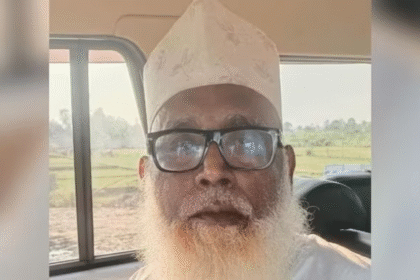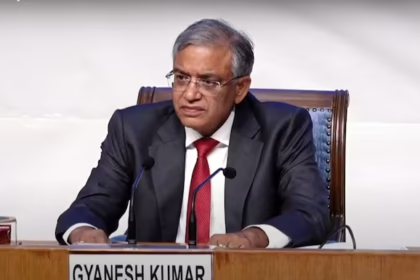Satyapal Malik, Former J&K Governor and Veteran Politician, Passes Away at 79 – Nation Mourns Loss of Key Political Voice
Former J&K Governor Satyapal Malik passes away at 79. A prominent political figure, his death marks the end of a significant chapter in Indian public life
Satyapal Malik, 79, former Jammu and Kashmir governor passed away at Delhi’s Ram Manohar Lohia Hospital after a prolonged illness, his personal secretary KS Rana confirmed on Tuesday. Malik had been undergoing treatment for kidney-related complications.
Authorities at Delhi hospital said that former governor passed away at 1:10 PM on Tuesday, reported news agency ANI. Malik was admitted to the hospital on May 11 and had been receiving dialysis as part of his treatment.
Earlier on June 8, Satyapal Malik had shared a health update on social media, describing his condition as “serious.” A day prior, the veteran politician posted on X that he had been hospitalised for the past month and was undergoing treatment for kidney-related issues.
India bid farewell today to one of its most outspoken and controversial political voices, Satyapal Malik, who passed away at the age of 79. The former Governor of Jammu & Kashmir, Goa, Bihar, and Meghalaya breathed his last after a period of illness, leaving behind a legacy marked by fearless commentary, administrative decisions during turbulent times, and an unflinching commitment to his interpretation of public service.

As condolences poured in from across the political spectrum, Malik’s death marked the end of a remarkable and often tumultuous journey through Indian politics. From his early days in student politics to holding gubernatorial responsibilities during one of the most sensitive chapters in Kashmir’s history, Malik was never far from the headlines—and rarely shied away from controversy.
Born on July 24, 1946, in Hisawada village in Meerut, Uttar Pradesh, Satyapal Malik’s political career began with his association with the Bharatiya Kranti Dal, later becoming a member of the Janata Dal and eventually the Bharatiya Janata Party (BJP). He served as a Member of Parliament from Aligarh in 1989, and later in the Rajya Sabha, representing Uttar Pradesh. Over the decades, he remained a visible and vocal figure in Indian politics, known for his strong opinions, especially on issues of farmers’ rights and corruption.
His political trajectory saw multiple party affiliations, but his nationalist tone and rural grounding remained consistent.
Satyapal Malik’s most prominent and impactful role came when he was appointed Governor of Jammu & Kashmir in August 2018. He served during a period that would later be recorded as one of the most critical in the region’s history.
On August 5, 2019, the Government of India revoked Article 370, stripping Jammu & Kashmir of its special status. As the constitutional head of the state during the transition, Malik oversaw administrative affairs amidst unprecedented political and social upheaval. The bifurcation of the state into two Union Territories—Jammu & Kashmir and Ladakh—occurred under his watch.

Despite being a BJP appointee, Malik often distanced himself from the party line in later years, criticizing both the Centre’s handling of Kashmir and farm laws, leading to friction within political circles.
What truly made Satyapal Malik stand out was his unfiltered way of expressing opinions. In his post-gubernatorial years, Malik frequently took strong positions on national issues, even when they went against the party that once appointed him.
His open criticism of the 2020–2021 farm laws and vocal support for protesting farmers earned him both praise and criticism. Malik accused the government of “being indifferent” to farmer deaths during the protests and made headlines when he alleged irregularities and “corruption” in Kashmir under central oversight.
In multiple interviews, Malik reiterated his belief in speaking “truth to power,” regardless of consequences. His candid remarks made him a regular presence in news cycles, and while some criticized him for being opportunistic, many hailed him as a rare breed of politician willing to dissent.
Besides Jammu & Kashmir, Malik served as Governor of:
Bihar (2017–2018),
Goa (2020),
Meghalaya (2020–2022).
Each tenure had its own share of challenges. In Meghalaya, Malik continued to raise issues of administrative irregularities, while in Bihar, his appointment was largely seen as a low-key period before his shift to Kashmir.
Even after completing his term in Meghalaya, he remained vocal in public discourse, often giving interviews and speeches critical of the central administration, particularly regarding democratic values, press freedom, and rural distress.
In the past few months, Malik had reportedly been battling age-related ailments. While his public appearances had declined, he remained active through statements and interviews until recently.
His death prompted a wave of condolences across the political aisle.
Prime Minister Narendra Modi expressed his condolences on X (formerly Twitter):
“Saddened by the passing of Shri Satyapal Malik Ji. He served the nation with dedication and was known for his administrative skills. My condolences to his family and supporters.”
Congress leader Rahul Gandhi wrote:
“Satyapal Malik Ji was a fearless voice in Indian politics. His unwavering stance on issues that affected the common people, especially farmers, will be remembered. Deepest condolences to his family.”
Farmer leader Rakesh Tikait, who had found an ally in Malik during the farm protests, said:
“He stood with us when most others turned away. His honesty and courage made him a people’s governor.”
Even critics of Malik acknowledged his fearless approach to governance and politics. Many hailed him as a “people’s politician”, someone who did not hesitate to question the establishment, even after having been part of it.
Satyapal Malik’s political career may not be remembered for landmark legislation or flamboyant leadership. But his legacy lies in his audacity to speak out, especially during moments when silence would have been easier.
He was a governor who opposed his own government’s actions, a politician who defended farmers when few others did, and a public figure who insisted that truth must always take precedence over political loyalty.
Whether it was Kashmir, the farm laws, or the state of Indian democracy, Malik chose to stand where he felt the people stood—often at great personal and political cost.
The Uttar Pradesh government has announced full state honours for Satyapal Malik’s funeral. His final rites are expected to be held in Meerut, his birthplace, where thousands are expected to gather to pay their last respects.
A public condolence meet is being organized by farmer unions and civil society groups in Delhi and Chandigarh, where Malik is regarded as a symbol of resistance and rural representation.








